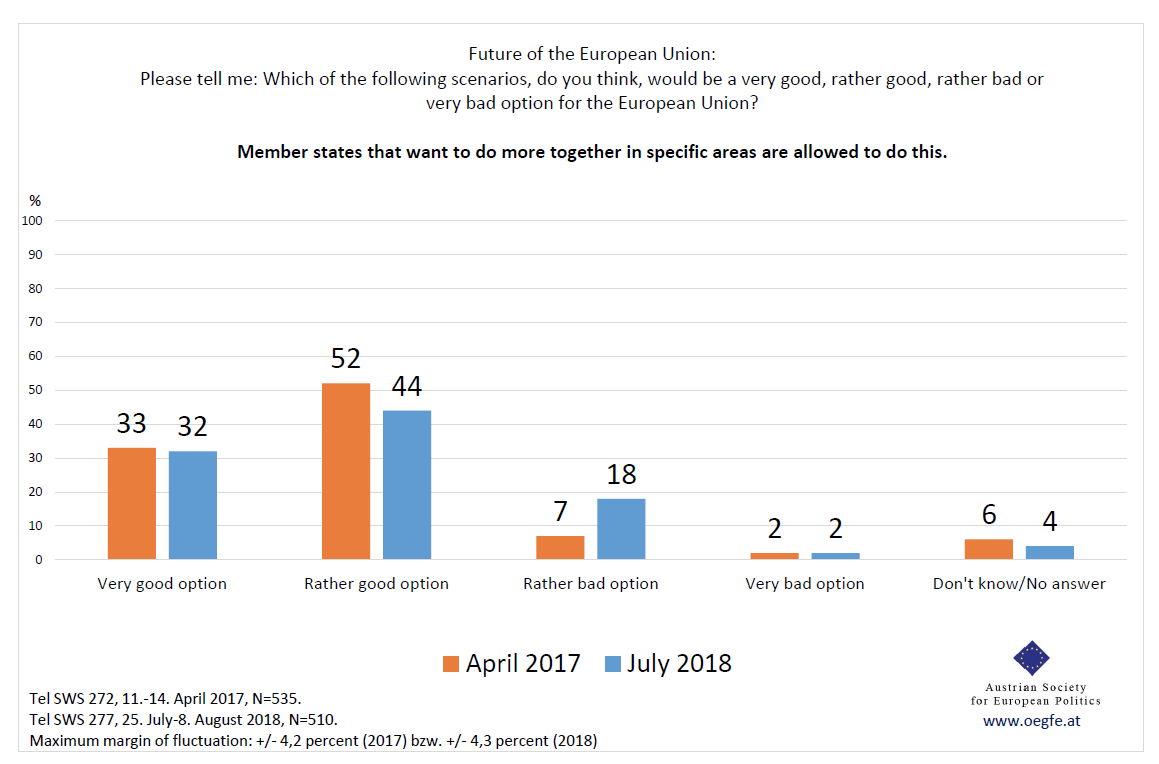A majority of Austrians wish for a more efficient Union and at the same time support greater cooperation among the Member States as well as a proactive role for our country. This is the result of an Austria-wide survey by the Austrian Society for European Policy (ÖGfE), which was conducted at the end of July / beginning of August 2018.
Seven out of ten respondents say that it would be a “very good” (37 percent) or “rather good” (33 percent) option for the future of the European Union if EU Member States deepen their cooperation in all policy areas. Just under a quarter (24 percent) do not agree and state that an intensified cooperation between the (future) EU-27 would be “rather bad” (18 percent) or “very bad” (6 percent) (rest to 100 percent = “do not know / no answer”). Compared to an ÖGfE survey of July 2017, the attitude of respondents on this issue has not changed remarkably.
At the same time, eight out of ten respondents want the EU to focus on selected policy areas while leaving other areas to the Member States – 34 percent consider this a “very good” and 46 percent a “rather good” option. Less than a fifth are skeptical about the scenario “Doing less more efficiently” (“rather bad”: 15 percent | “very bad”: 2 percent). Compared to the previous year, the number of those who want a “more reserved” EU has risen by 11 percentage points.
Three out of four respondents (76 percent) also agree that those Member States wishing to work together more closely in certain areas should do so – 32 percent consider this a “very good”, 44 percent a “rather good” option for the EU’s future. On the other hand, one in five considers the scenario “Those who want more, do more” as “rather bad” (18 percent) or “very bad” (2 percent). However, the endorsement of such a different pace of integration has declined by 9 percentage points over the past year.
If a group of countries decided to work together more closely within the EU, 60 percent of respondents would support that Austria should be part of such a group. 20 percent oppose this option, an equally high percentage does not respond.
Asked which model for the EU’s future most closely responds to their personal preferences, then 35 percent of the interviewees would opt for the concept of German Chancellor Angela Merkel, 25 percent would prefer an EU à la Macron and 9 per cent would like to see the Union developing in the way Hungarian Prime Minister Viktor Orbán is proposing. Almost a third of respondents (31 percent), however, are unable to opt for one of the three proposed names.
The current survey was conducted from 25 July to 8 August 2018 by the Sozialwissenschaftliche Studiengesellschaft (SWS) on behalf of ÖGfE. 510 persons were questioned via telephone (Austrian population from the age of 18 / weighted according to gender, age and education). Maximum margin of fluctuation approx. +/- 4,34 percent. Difference to 100 percent due to rounded values respectively (*) „don’t know / no answer.)






